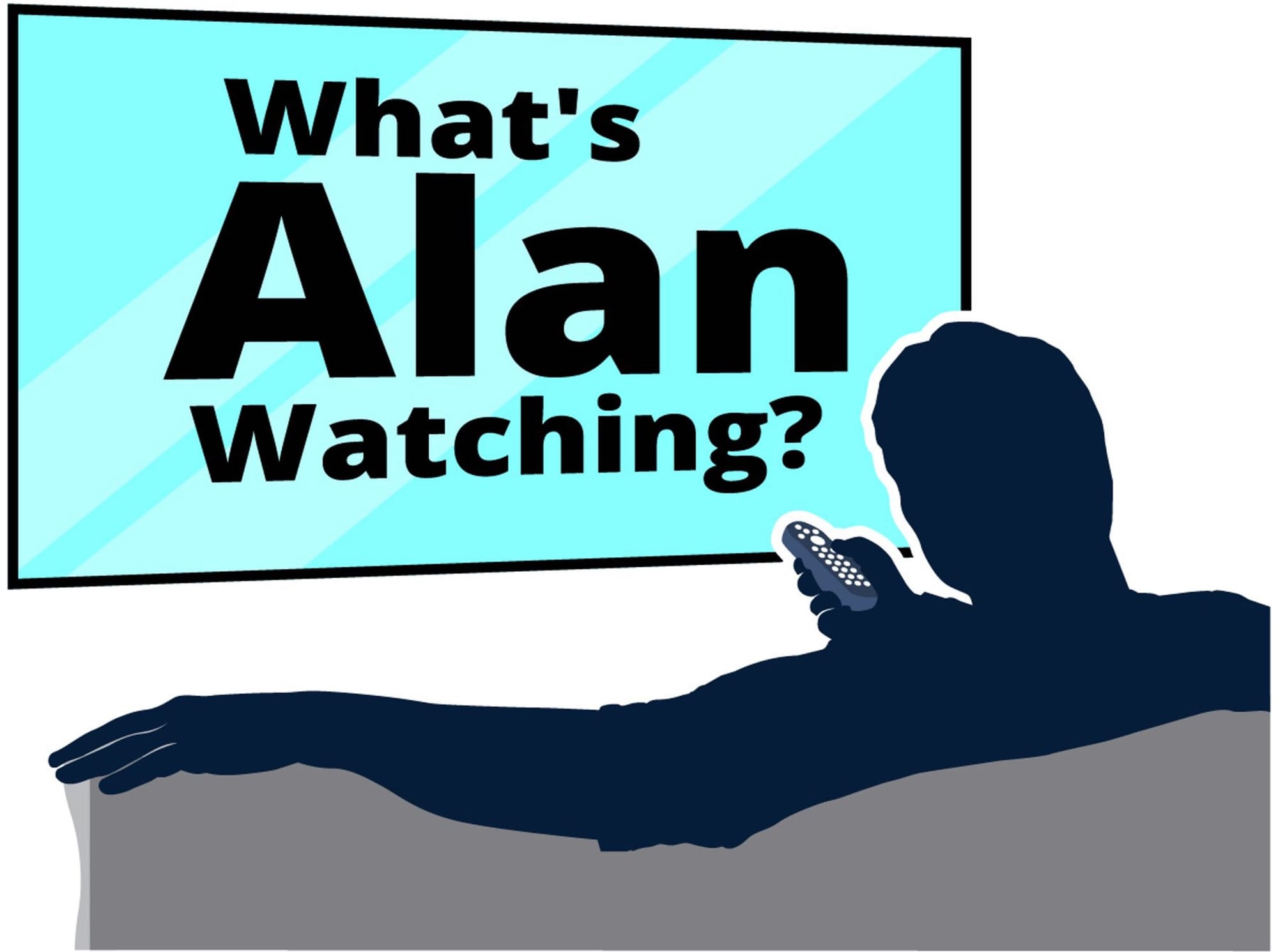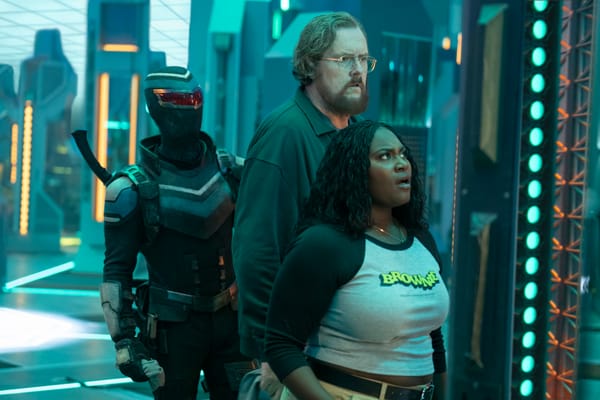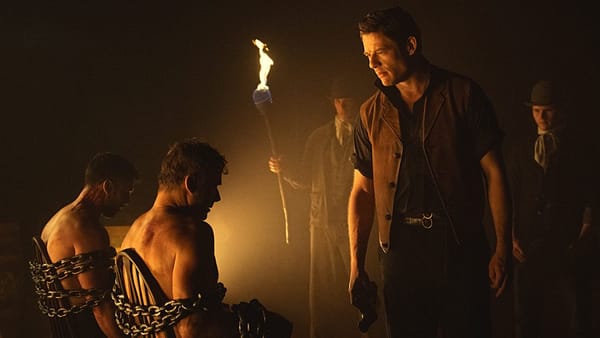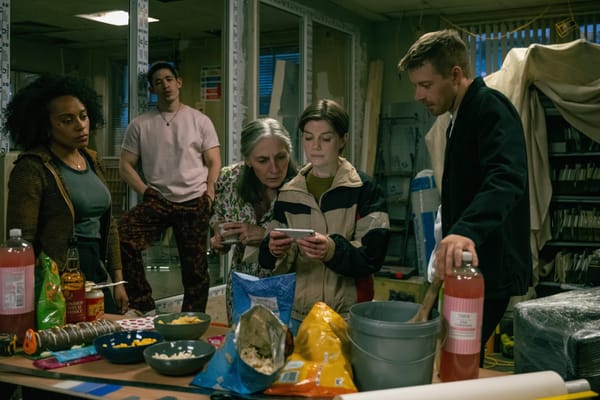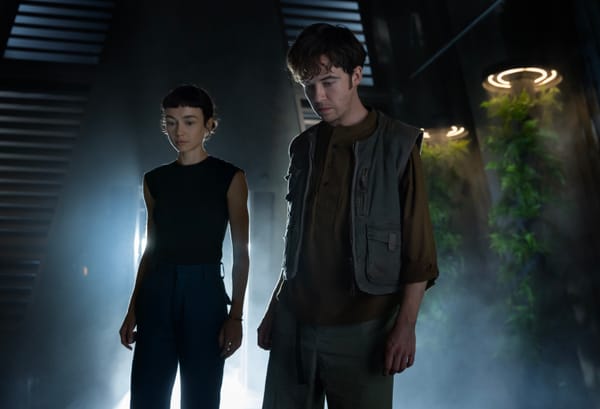The Lowdown recap: Season 1, episode 1 & 2, 'Pilot'/'The Devil's Mama'
Meet Lee Raybon. He's a LOT.
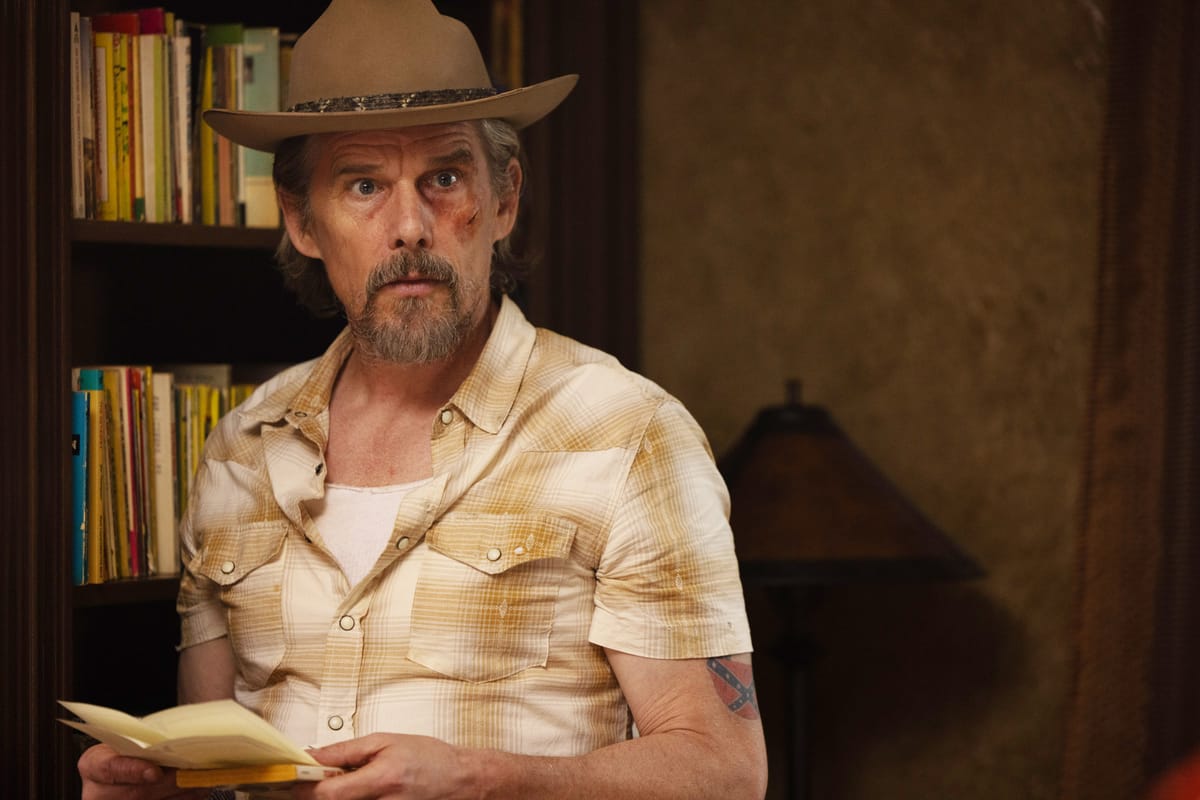
[This take on the series premiere of FX's The Lowdown is free for anyone who wants to read it, whether they're curious about the show and/or my take on it. My coverage of the rest of the season will be for paid subscribers only.]
My review of the two-part series premiere of The Lowdown, "Pilot" & "The Devil's Mama" — with spoilers — coming up just as soon as I give you a thousand dollars for your sunglasses, a hat, and a brief makeup tutorial...
"Don't meet your heroes." -Marty
The Lowdown was created by Sterlin Harjo, whose last series for Hulu, Reservation Dogs, is one of the best television shows I've ever seen. This is not hyperbole. In two of its three seasons, I named it the best show of that year, and that was when it overlapped with the likes of Succession, Better Call Saul, Atlanta, Barry, Andor, The Bear, and more. In its other season, it finished second. It's an extraordinary piece of work — funny and poignant and sweet and weird and specific and universal and everything else you could possibly want — and if Harjo doing a new series with a big name(*) and a higher-profile overall cast leads more people to binge Rez Dogs on Hulu, then The Lowdown will have already accomplished a lot.
(*) Said big name already guest-starred in the penultimate Rez Dogs, in case you need added enticement.
But here's the thing about Rez Dogs: it takes a little while to get going. Its early episodes are never bad, but you can feel Harjo and his collaborators figuring out in real time exactly what the show is — or rather, recognizing that the show can be anything it wants to be in a given episode. I've never encountered a single person I recommended it to who came back later to complain that I'd steered them wrong, or even that I'd overhyped something that they found god, not great. But it's also not something where you watch the first episode, or even the first few, and come away with both a clear sense of what the show is, and that you're on the way to something great.
With The Lowdown, I had no question about either. It arrives fully-formed, in complete command of its tone, its look, and even its story — at least, to the extent that any kind of noir, comedic or otherwise, expects you to be able to follow the plot. I came to the end of the first episode giddy that the second one was immediately available to me.
To be fair to Rez Dogs, its successor is easier to focus on because there are so many more things it resembles. It's a bit The Big Lebowski; the moment where Lee puts down his gun right before the Nazis grab him and throw him into a trunk felt almost exactly like The Dude trying to barricade a door that pulls open, rather than pushes. It's a lot The Long Goodbye, Robert Altman's incredible take on Raymond Chandler, with Elliott Gould as a hard-boiled gumshoe so out of his own element that he seems like a clown(*). There are traces of other classic FX shows like Justified and Terriers and, yes, Reservation Dogs — and not just because Willie Jack herself, Paulina Alexis, has a cameo in the scene where we're introduced to Lee doing a fantastic movie-star strut down a Tulsa street. The show wears its influences on its sleeve, and isn't afraid to make in-jokes when it's in the mood(**). But even though these episodes have to introduce a big and eclectic cast of characters — played by a big and eclectic cast of actors — there's enough of a recognizable model that it can just burst out of the gate and make you both understand and love it.
(*) That movie is also a huge inspiration on Russian Doll, and, for that matter, on Lebowski.
(**) See, for instance, Lee getting tossed out of the memorial and making a scene by singing "John Brown's Body," a song alluding to the man Ethan Hawke played brilliantly in Showtime's The Good Lord Bird. Last week I moderated a panel with Harjo and Hawke, and beforehand Harjo told me that the song was a Hawke improv, as they were trying to come up with different things Lee could do to draw attention to himself in that moment.
What's impressive, if not surprising, is how lovable it is despite the fact that Lee Raybon is among the most insufferable main characters a TV show has featured in a long time. You know how the average human body is around 60% water? Lee Raybon is at least 80% affectation(*). He's got his hat, his boots, his van, his bookstore, his ironic Confederate flag tattoo. He calls himself a "truthstorian" (a word Harjo says he invented) rather than a reporter. His "business card" is a Post-It he filled out earlier that day. He claims to be sober but follows that by ordering a Pilsner. He will on occasion talk about himself in the third person. When two neo-Nazis come to beat him up for writing about them in the newspaper, he interrupts to point out, "It's a longform magazine! It's not a newspaper!" At a meeting with the overwhelmed editor of said longform magazine, the Heartland Press, Lee compares himself to FDR hearing the name of Adolph Hitler for the first time. One or two of those things on their own? Fine. All of them together, though, suggest a man who has carefully curated everything about himself to present a certain image to the world. Lee Raybon wants everyone to think of him as the bravest, coolest, most idiosyncratic crusader for truth and history who has ever lived.
(*) For what it's worth, at the aforementioned panel, I used the word "affectations" to describe Lee, and Hawke laughed and said he gets accused of taking on affectations all the time, when it's just stuff he likes. He doesn't use a manual typewriter because he's pretentious, he said, but because he enjoys the sound and feel of the clacking of the keys, and because it's a challenge to not be able to easily go back and delete what he just wrote.
In the wrong hands, a show built around such a character should be as painful to sit through as that meeting is for Lee's poor editor. But The Lowdown is in the right hands of Harjo — who wrote and directed the pilot and directed Sneha Koorse's script for "The Devil's Mama" — and Hawke. And they take all the proper steps along the way.
First, they let us know that Lee means well. He is self-aggrandizing. He lacks a filter, and possibly any sense of hygiene. But he brings food to the unhoused man who sleeps on the sidewalk next to Lee's used bookstore, Hoot Owl Books. And he's trying to take down Nazis, shady corporate interests, crooked politicians, etc. As he tells his daughter Francis when he tries finding the number for murderous contractor Allen Murphy, he's a good guy who goes after bad guys. His motives may be suspect, but his goals are not.
(For that matter, his relationship with Francis does a lot to soften his most self-indulgent traits. For all the other obnoxious things he does, she clearly adores him, and she's clearly a smart, level-headed kid, who enjoys going on stakeouts with her Fun Dad.)
Second, we see early and often that the whole persona he's crafted is meant to convince himself as much as everyone else that he's this wildly original, brilliant, courageous guy, when in fact he's largely a collection of clichés in human form. When he tries quoting Bukowski at Marty, the private eye who appears to be working for gubernatorial candidate Donald Washberg, the ultra-literate Marty retorts, "Be more predictable!" Early in the pilot, Lee takes a meeting with Frank Martin, a local real estate magnate who's clearly up to no good. Lee lays out his plan to find out what Frank is up to and stop it, then points some finger guns at him. Driving away from the meeting — along with a Joe Brainard painting he bribed the country club hostess to let him steal — he can't stop recreating this "Gotcha!" moment for himself, because it matters to him deeply that people think of him as the kind of guy who can look cool pulling off such a move.
Third, the series understands that Lee exasperating, and is full of colorful, often more sympathetic, characters who also understand that he's exasperating, and aren't shy about telling him that. Few shows are more difficult to watch than one with an annoying main character whom the show mistakenly thinks is awesome. (In the TV criticism game, we calls this The Dawson Leery Problem.) But everyone else on The Lowdown is constantly calling Lee out on all his nonsense, and are pretty much always presented as the sympathetic party in the exchange. And they're played by a murderer's row of supporting actors: Keith David as Marty, Kyle MacLachlan as Donald, Kaniehtiio Horn as Lee's ex Samantha, Michael Hitchcock as his antiques dealer pal Ray, Killer Mike as local porn publisher Cyrus, Jeanne Tripplehorn as Dale's widow Betty Jo, Tracy Letts (who won a Pulitzer for writing a play, August Osage County, set close to Tulsa) as Frank, etc. Donald's clearly another one of the bad guys, but when Lee crashes the memorial of his brother — a brother who apparently committed suicide shortly after Lee published a scathing article about the entire Washberg clan — is Donald exactly wrong to call him out for it?
Fourth, and most importantly, Lee is played by Ethan Hawke, who has made an art of playing charming dirtbags — men who trigger every alarm bell about why you should dislike and avoid them, yet you usually(*) can't resist because of Hawke's performance. At that panel last week, Hawke said that you have to play a role like this as if you're a lawyer arguing on behalf of your character. Actors who play villains talk all the time about how they're not playing them as a villain, but as someone who thinks they're in the right. Lee is insecure, and he's aware of all of the ways he's messed up his life and continues to do so. But to get back to the first point, he really does have good intentions most of the time. And he thinks on some level that this persona will help him accomplish what he wants to in life. Couple that with Hawke's magnetism, his empathy, and his underrated skill at comedy, and you have Lee Raybon, whose overwhelming aroma of toxic narcissism becomes so ridiculous that the worse he acts, the more delightful he becomes. The scene where he gets tossed from the memorial, and also compares himself to the moneylenders being thrown out of the temple, left me cackling at Lee's complete and utter shamelessness, as well as at Hawke's lack of vanity in playing this tattered schmuck.
(*) I qualify with "usually" because Reality Bites falls into the Dawson Leery trap and has Winona Ryder pick Hawke over Ben Stiller. Though if we're mixing our Nineties teen drama metaphors, that's maybe more of an "I Choose Me" situation. The point is, the lead singer of Hey That's My Bike is bad and should feel bad.
And almost everyone on The Lowdown is ridiculous in their own way, too, particularly in their pained awareness that they are going to let Lee Raybon talk them into doing what he wants. Cyrus (whose eyepatches always match the rest of his outfits) doesn't need the headache of running another of Lee's stories, and he winds up with a busted storefront window for his trouble. But he can't resist. Dan, the lawyer whose office is on the same block as Hoot Owl, doesn't like hiding things that come out of Lee's pants, but he does it every time. (Though he at least draws the line at Mein Kampf.) Ray doesn't want to act as a fence for the stolen Brainard painting, but he lets Lee bulldoze him like always. Marty loves Lee's writing, and is more than a little pretentious in his own right. (At the end of a long conversation about the idea of people missing something, Lee asks Marty what he's missing, and Marty replies, "I don't know. But I'll find out.") When Lee goes undercover as a white supremacist to visit the mom of one of the Nazis that Allen kills at the end of the pilot, the mom(*) is of course completely won over by him.
(*) A welcome instance of a character clearly written for Dale Dickey who was played by the actual Dale Dickey. (The only acceptable alternative in such a case is if Dickey's not available but Beth Grant is.)
Though it may not seem like it based on the 2000-odd words I've written already, there actually is a plot to The Lowdown, involving a connection between the Washbergs, the Nazis, Frank, Allen, and possibly other players yet to be revealed. But it's deliberately murky, the way it always is in this kind of story. That's the case both in versions played entirely for laughs like Lebowski, and the ones played dead seriously like The Big Sleep (where legend has it, even author Raymond Chandler couldn't explain to the screenwriters who kills the chauffeur, and why), or something that falls in between those poles like this. Yes, a lot of the show is silly, including the bookstore somehow employing two different incompetent security guards at the same time(*). But Dale's death is played as dark and tragic, Betty Jo's complicated feelings — she grieves him while continuing an affair with Donald — real. When Allen kills the Nazis, it's legitimately scary, especially since Lee is trapped in their trunk at the time. Lee's conversations with Francis and Samantha feel honest even when he's spinning a web of BS for his understandably skeptical ex. There's genuine interpersonal drama happening within both the shenanigans and whatever the story is about.
(*) Mel from The Pitt and the eyeball from Alien: Earth may have serious competition for Best New TV Character of 2025 from Waylon, idiot cousin to Hoot Owl clerk Deidre. The guy just gets everything wrong, in the most overconfident fashion imaginable. When Lee complains that he got abducted from right in front of the store that Waylon was allegedly guarding, Waylon objects, "You're a grown-ass man! Throw hands!" Later, when Lee pleads with Waylon and his cousin Henry to dispose of the Nazis' car so no one knows he had it, they instead film a rap video of themselves burning the thing, which already has 142 likes by the end of the second episode.
For the moment, we know that there are notes from Dale (played by the great Tim Blake Nelson) hidden within his collection of Jim Thompson novels, which Lee stumbles upon by accident during the estate sale at his house. We know that Dale has Nazi paraphernalia hidden in his study, which perhaps connects him to the Nazis. We know that the Nazis did some work for Allen, that Allen in turn works for Frank, and that Allen felt the need to kill them for a mistake they made on the job. We know Marty is working some kind of angle on behalf of Donald. We know that Lee is attempting to take down all of these people if he can.
And we know that this character, and this show, are going to make that attempt a damned entertaining one.
What did everybody else think?
